In the eighties, my French wife told the local French Police that Islam was an obstacle to our relationship!
In 1996, she told the local English Police that her life was in danger because I found out that she had betrayed me!
Within months she was helped by two "Jehovah Witnesses", our own business partners, to kick our son and me out of our home and business! I lost all material wealth, but kept my spirituality intact. My wife even stole part of our son's wealth!
https://www.youtube.com/watch?v=bFgYcdQVlto
The Call to Prayer was performed by Hassen Rasool who was delighted to
be asked to perform the Adhan amongst the Windsor and Eton Choral
Society in the Eton School Hall on the 27th September 2014.
The Armed Man by Karl Jenkins with Haydn’s Mass in Time of War was
performed to mark the 100th anniversary of the start of World War One,
Windsor and Eton Choral Society proudly presented two magnificent choral
works with the Adhan ( The Call to Prayer) nestled between the two,
providing a brilliantly contrasted evening of music and spirituality
which was both exhilarating and inspiring.
"The movement which is the existence of the universe is the movement of
love."
Ibn 'Arabi, Fusûs al-Hikam
https://www.youtube.com/watch?v=stEic9EXC04
Islam Calls to the Middle Path - Dr Laurence Brown | HolySpeech
Sorry, folks, there is a bovine excrement humming in the background!
https://www.youtube.com/watch?v=nJPUd-4NNAI
My Journey to Islam - Dr. Laurence Brown
https://www.youtube.com/watch?v=8JP8x_KhCG8
Wonderful Behaviour of Street Dogs During Islamic Call
Published on 9 Oct 2012
Wednesday 2nd May 2018
While writing and posting this! 2:30 A.M.
https://www.youtube.com/watch?v=U9JK3DnT97E

Published on 6 Jul 2015
How A Muslim Child Saved An Evangelical Minister From A Life of Hatred towards the "House of Ishmael", Muslims and Islam.
When my Baby Angels are with me, every night is
Laylat al-Bara’at or Niṣf Sha‘bān or Shab-e Bara’at.
And, I do not BEG GOD, but THANK HIM 'millions' of times!!!
Manifeste contre l'antisémitisme et modification du Saint Coran
Streamed live on 26 Apr 2018
Retour sur la fameuse pétition du manifeste contre l'antisémitisme
publié dans le journal le Parisien de dimanche dernier qui finissait par
demander le retrait de certains versets du Coran.
En dehors de l'aspect complètement stupide au niveau intellectuel d'une
telle demande, nous revenons dans cette vidéo sur certaines phrases de
ce manifeste mais également sur la réalité historique de la soi-disant
violence intrinsèque de l'islam qui est un fantasme totalement inventé
et une négation de l'histoire et de la réalité.
Il ne s'agit pas de dire ici que les musulmans sont blancs comme neige,
sont immaculés, sont des anges ou je ne sais quelle autre sottise. Il
s'agit juste de rappeler les faits historiques que l'on retrouve dans
les livres des bibliothèques occidentales puisqu'ils ont été écrits par
les plus éminents professeurs des plus prestigieuses universités. À
l'occasion de la sortie du livre "Ils aiment l'islam" qui répertorie un
très grand nombre de citations qui affirment exactement l'inverse la
propagande actuelle, nous vous proposons d'en citer quelques-unes dans
cette vidéo.
ISLAM UPSIDE DOWN, BUT STILL THE BEST! SALVATION NIGHT!
Laylat al-Bara’at or Niṣf Sha‘bān or Shab-e Bara’at.
* Arabic Laylat al-Bara’at or Niṣf Sha‘bān
* Persian and Urdu - Shab-e Bara’at.
* See Laylat al-Qadr, Laylat al-Mi'raj and Laylat al-Raghaib.
https://www.youtube.com/watch?v=VLpjfRcgnRQ
https://www.youtube.com/watch?v=QWze0rHwlKs
Night of "Salvation", Innocence, Records, Assignment, or Deliverance. (I DID NOT FIND THIS IN THE HOLY BOOK!!!???)
Holy Quran
WIKIPEDIA
"Indeed, We sent it down during a blessed night. Indeed, We were to
warn [mankind]. On that night is made distinct every precise matter-"[Quran 44:3–4]According to Tafsir Ibn Kathir,[4] the more correct interpretation of this blessed night been attributed to another Islamic holy night, Laylat al-Qadr, based on additional verses.[5][6][7]
https://www.youtube.com/watch?v=4QgLh_pDbw0
Birthday of Muhammad al-Mahdi
Mid-Sha'ban
According to Twelver Shias, Muhammad
al-Mahdi, the final Shia Imām, was born on 15 Sha'ban.
Shi'as celebrate Muhammad al-Mahdi's birthday on that day and perform religious
acts such as prayers, fasting, and worship. Iranian cities are decorated on
night of Mid-Sha'ban.[8][9]Not disregarding its 'good' side, this is Islam upside down! It makes Muslims feel good that this 15th night of Sha'ban (8th month of the Muslim Calendar) is regarded as very blessed. Why? Muslims pray, beg, supplicate, remember Allah to SEEK FREEDOM FROM GOD'S PUNISHMENT (AZAAB) and from CALAMITY, but does not do God's Will!
https://www.youtube.com/watch?v=rbSFohzmWf0
WHERE DID MUSLIMS GET THIS NIGHT OF SALVATION???
SALVATION FOR WHAT???
WHAT IS SALVATION???
WHY SALVATION???
https://www.youtube.com/watch?v=LzSyGjsd9jY&t=2s
Dr. Yasir Qadhi Destroys The Myth Of Different Versions Of Quran
Published on 25 Apr 2018
GOD: I will never free a disobedient, cowardly, hypocritical, selfish, lazy, and ignorant people! How dare they even ask me for anything when they hardly do what I guided the whole of humankind to do for more than 1400 years, just like I did the Bani Isra'il (Jews) and the Nazarenes (Christians) before them, and those before them?
GOD: You, hypocrites, you always come to Me repenting and seeking forgiveness when you never stop sinning apart from a very few amongst you, many of whom are new reverts to Islam!
GOD: Do you think that I lack in Mercy to forgive the sins and transgressions of ONLY MUSLIMS? Do hundreds of millions of "non-Muslims" not deserve My Mercy too? You do not even forgive one another and live an entire life of disunity!
GOD: Do you ever come to me showing that you have settled all debts owed to/by you by Muslims and non-Muslims alike?
GOD: What is this nonsense about "Sunni" Ahl as-Sunnah Wah Jama’ah, Shi'a or whatever Muslim you like to call yourselves and others?
Achtung! Never believe what I say or write!
DO YOUR OWN RESEARCH!
(Photo removed due to the forces of evil within and outside ourselves)
(Photo removed due to the forces of evil within and outside ourselves)
GOD:
Did I ever tell you that if you recite “La Hawla walaa Quwwata illa
Billahil-aliyil Azeem” forty times with three times Durood Shareef
before and after" I will forgive forty years of your sins and forty Hoors will
await to serve you in Jannat al-Firdous"? Did I create "humans" like you, or
Shaytaan did?
GOD: Did I ever tell you that "the departed
souls (Arwaah) of the Muslims visit the houses of their friends and relatives
on this night"? How can they when
your homes are filled with Shayatiin and Evil Djinns? Your
dead never come back!!!
Some devils try to harm my Angels!
GOD: Ô Humankind,
do not believe everything you read or hear, and STOP BEGGING ME while you
refuse to DO THE WORK (JIHAAD) you have been assigned for your own good and for
that of the whole of Creation, the good, the bad, and the ugly!
I do not seek to convince anybody!
My example speaks for itself!
(Photo removed due to the forces of evil within and outside ourselves)
(Photo removed due to the forces of evil within and outside ourselves)
??? Hadrat Ayesha Siddiqa (radi Allahu ta’ala anha) reports:
“One night, which was the 15th of Shabaan, I
did not find the Beloved Prophet (SallAllahu Alaihi wa Sallam) in the house so
I went in search of him. After a long search, I found him in Baqiah (the
cemetery of Madinah) offering Du’a for the deceased and praying for their
forgiveness”. (Baihaqi)
??? "...the Most Beloved Prophet
(SallAllahu Alaihi wa Sallam) is been reported as having visited the cemetery
on this night and spending a long time therein, lamenting, reading and praying
for the deceased."
??? "According to the Hadith
Shareef which is narrated by Ibne Habaan (radi Allahu ta’ala anhu) that
Rasoolullah (SallAllahu Alaihi wa Sallam) said:
??? “When the night of 15th Shabaan
arrives spend the night awake and keep
fast the next day”.
??? Whoso fasts for three days during
Shabaan, all his past sins are wiped off”.
(Baihaqi) Fasting is also recommended on the 13th, 14th and 15th of Shabaan.
??? "...if one reads Surah Dukhan seven
times on this night, Almighty Allah will reward you with 70 worldly needs and
70 deeds for the Hereafter."
??? Sayyiduna Rasoolullah (SallAllahu
Alaihi wa Sallam) said:
??? “Almighty Allah forgives all Muslims on this
night, besides the fortune tellers, the magicians, the alcoholics, those who
disrespect their parents and those who take part and encourage adultery”.
??? "In another narration, the
following people have also been mentioned:
One who deals in
usury (Riba),
??? "One who wears his trousers below
his ankle with pride and arrogance..."
One who creates
disunity among two Muslims,
??? The person who unjustly takes
away the right and property of another Muslim and has not yet rectified
himself.
??? offer special prayers and repent
sincerely for our past sins and ask for His Forgiveness.
??? on this night the Doors of Mercy
and Forgiveness are opened wide,
??? "While we are praying and
asking for ourselves and family, we should also remember in our Du’as
the Muslim Ummah facing calamities in many parts of the world, that may Allah
Ta’ala grant them the strength and Istiqaamat (steadfastness) in Deen."
My children, DO THE JOB, and Allah will always bless you!
??? "Basharat of Jannat: Sayyiduna Rasulullah (SallAllahu
Alaihi wa Sallam) is reported to have said that Allah Ta’ala instructs and
assigns 100 angels to the person who performs 100 Nafil Salaahs on this
auspicious night – 30 of which will bring the good news of Jannat, 30 angels to
protect one from the Azaab (Punishment) of Dozakh (Hell), 30 to remove all
misfortunes and miseries of this world and 10 angels to protect one from
Shaitaan."
??? "Reward for ten thousand good
Deeds: Anyone
who performs 20 rakaahs of Nafil after Maghrib in such a way that after Surah
Fatiha, recites Surah Ikhlaas 10 times in every rakaah, will be rewarded
abundantly by Allah Ta’ala, and ten thousand good deeds will be recorded in his
Amal Namaa (Book of Deeds)."
And on and on !!!???
Allah gave me both Paradise and Hell on Earth, and I am always thankful to Him FOR THE PARADISE!
GOD: Ô Humankind,
do not believe everything you read or hear, and STOP BEGGING ME while you
refuse to DO THE WORK (JIHAAD) you have been assigned for your own good and for
that of the whole of Creation, the good, the bad, and the ugly!
BAFS
Tuesday 1st and Wednesday 2nd May
2018
WIKI or JOOWIPEDIA
"The seven deadly sins, also known as the capital vices or cardinal sins, is a grouping and classification of vices within Christian teachings."
"According to the standard list, they are pride, greed, lust, envy, gluttony, wrath and sloth,[2] which are also contrary to the seven virtues. These sins are often thought to be abuses or excessive versions of one's natural faculties or passions (for example, gluttony abuses one's desire to eat)."
"The Catechism of the Catholic Church defines virtue as "a habitual and firm disposition to do the good."[1] Traditionally, the seven Christian virtues or heavenly virtues combine the four classical cardinal virtues of prudence, justice, temperance and courage (or fortitude) with the three theological virtues of faith, hope and charity. These were adopted by the Church Fathers as the seven virtues.
WHEN THE DEVILS ATTACK ISLAM AND MUSLIMS!
WIKI or JOOWIPEDIA
"The seven deadly sins, also known as the capital vices or cardinal sins, is a grouping and classification of vices within Christian teachings."
"According to the standard list, they are pride, greed, lust, envy, gluttony, wrath and sloth,[2] which are also contrary to the seven virtues. These sins are often thought to be abuses or excessive versions of one's natural faculties or passions (for example, gluttony abuses one's desire to eat)."
"The Catechism of the Catholic Church defines virtue as "a habitual and firm disposition to do the good."[1] Traditionally, the seven Christian virtues or heavenly virtues combine the four classical cardinal virtues of prudence, justice, temperance and courage (or fortitude) with the three theological virtues of faith, hope and charity. These were adopted by the Church Fathers as the seven virtues.
WHEN THE DEVILS ATTACK ISLAM AND MUSLIMS!
https://www.youtube.com/watch?v=WSKOUSC-3NM
Nouman Ali Khan is the NEW TERRORIST...FUNNY Imam Siraj Wahhaj...
Published on 5 Dec 2011
Category
DO SOME WORK TOO, AND GET THE TRANSLATION OF THOSE HINDUSTANI TITLES AND LYRICS BY YOURSELVES!
https://www.youtube.com/watch?v=3AtFhpgUUSI
KARTA HAI EK RAAVI DILSOZ YEH BAYAN- RAFI- FILM- ALAM ARA (1956)
https://www.youtube.com/watch?v=fYJnZRfLtsE
Khuda Ke Hath Izzat Hai
[Full Song] Ramzan Ki Azmat
https://www.youtube.com/watch?v=Rad2gbRFY8w
Parwar Digar-E-Alam - Mohd Rafi, Hatimtai Song
Citydesert
Desert Spirituality for the City
The Paradise of the Desert Fathers
“The Paradise of the Desert Fathers” is a collection of sayings
and narratives written about the Desert Fathers of the Egyptian desert.
The collection is widely known in the Coptic Church as Bustan Al-Rohbaan
(transliterated Arabic) or The Monks’ Garden.

A photoreprint of the 1907 work translated and edited by Ernest A. Wallis Budge (Chatto and Windus, London) – Paradise or Garden of the Holy Fathers, Being Histories of the Anchorites, Recluses, Monks, Coenobites and Ascetic Fathers of the Deserts of Egypt between AD CCL and AD CCCC Circiter Compiled by Athanasius Archbishop of Alexandria; Palladius Bishop of Helenopolis; Saint Jerome; and Others” – is available at http://www.ccel.org/ccel/athanasius/paradise1.titlepage.html [Volume I] and http://www.ccel.org/ccel/athanasius/paradise2 [volume II] and at http://archive.org/details/theparadiseorgar01unkwuoft These volumes are translated from a Syriac manuscript discovered in 1888.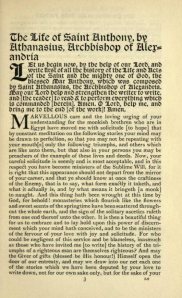
A photoreprint of the 1909 American reprint of Budge’s work is available at http://www.strobertbellarmine.net/books/Palladius–Paradise_Vol_01.pdf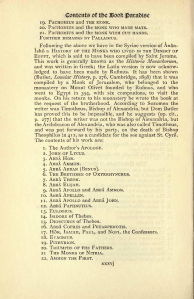
Extracts from The Paradise can be found at http://www.ewtn.com/library/SOURCES/DSRTFATH.TXT and http://groups.yahoo.com/neo/groups/arbible/conversations/topics/23931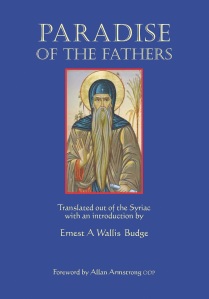
Various modern editions and reprints (of widely varying qualiuty and accuracy) of the 1907 work are available: for example, “Stories of the Holy Fathers [or The Paradise or Garden of the Holy Fathers: Being Histories of the Anchorites, Recluses, Monks, Coenobites, and Ascetic Fathers…”, Martino Fine Books, 1912; and “The Paradise of the Holy Fathers,” vol. II, translated by E. A. Wallis Budge, Seattle: St. Nectarios Press, 1984.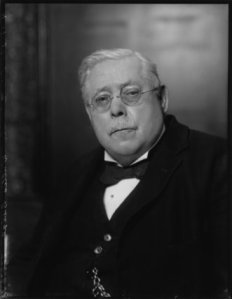
Sir Ernest Alfred Thompson Wallis Budge (27 July 1857 – 23 November 1934) was an English Egyptologist, Orientalist, and philologist who worked for the British Museum and published numerous works on the ancient Near East: see
http://en.wikipedia.org/wiki/E._A._Wallis_Budge and http://www.britishmuseum.org/research/search_the_collection_database/term_details.aspx?bioId=93650
Palladius of Galatia (368? – 431?) was a disciple of Evagrius and was ordained bishop by John Chrysostom. He was also one of the earliest historians of Christian monasticism. This work is a set of vignettes of leading Desert Fathers and Mothers.
See http://en.wikipedia.org/wiki/Palladius_of_Galatia http://desertfathers.blogspot.com.au/2012/02/palladius-368-431.html and http://www.ccel.org/ccel/wace/biodict.html?term=Palladius,%20bp.%20of%20Helenopolis
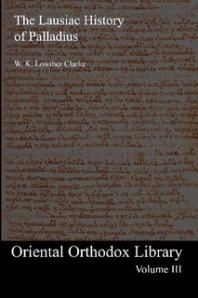
Palladius’ Lausiac History (Historia Lausiaca) is a seminal work archiving the Desert Fathers (early Christian monks who lived in the Egyptian desert) written in 419-420 at the request of Lausus, chamberlain at the court of the Byzantine Emperor Theodosius II. The introduction declares: “This book is a record of the virtuous asceticism and marvellous manner of life of those blessed and holy fathers, the monks and anchorites which inhabit the desert, (written) with a view of stirring to rivalry and imitation those who wish to realize the heavenly mode of life and desire to tread the road which leads to the kingdom of heaven. It contains also memoirs of aged women and illustrious God-inspired matrons, who with masculine and perfect mind have successfully accomplished the struggles of virtuous aceticism, (which may serve) as a model and object of desire for those women who long to wear the crown of continence and chastity.”
See: http://en.wikipedia.org/wiki/Lausiac_History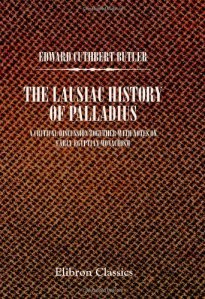
A translation in English is available at http://www.tertullian.org/fathers/palladius_lausiac_01_intro.htm http://www.tertullian.org/fathers/palladius_lausiac_02_text.htm
A photoreprint of the 1898 translation by Dom Cuthbert Butler is available at http://archive.org/details/lausiachistoryof01pall and of the 1918 translation by W.K. Lowther Clarke is available at http://archive.org/details/lausiachistoryof013039mbp
“The Lausiac History by Palladius (c. 365–431) is one of a handful of important texts from which we gain an eyewitness knowledge of early Egyptian monasticism. The text gets its name from the person to whom it is dedicated; Lausus was a chamberlain for the emperor Theodosius II. Palladius himself had been a pupil of the famous desert dweller Evagrius of Pontus. Similar in style and content to the Lives of the Desert Fathers written in the late fourth century, the Lausiac History contains seventy-one biographical “chapters” on desert ascetics in Egypt, Palestine, Syria and even Asia Minor.
The text is written for us, says Palladius, so that we might “emulate and imitate” those early monks in their journey to the kingdom of heaven. But his very first paragraph includes a startling addition. He records the lives of not only the desert fathers but also of the desert mothers or ammas. “It is written also to commemorate women far advanced in years and illustrious God-inspired mothers who have performed feats of virtuous asceticism in strong and perfect intention, as exemplars and models for those women who wish to wear the crown of self-abnegation and chastity.” These “holy highborn women,” writes Palladius, “lived the best and loftiest lives.” Unlike the Lives of the Desert Fathers, Palladius introduces us to several dozen women renunciants.
One writer speaks of the “huge silence” of the desert, but the Lausiac History also demonstrates the sheer scale and scope of early monasticism. There were hundreds of hermitages, large and small, that served tens of thousands of mothers and fathers. Palladius describes their bustling bakeries, tailors, metal workers, shoemakers, weavers, gardeners, carpenters, camel drivers, doctors, fullers, scribes, liturgies, and steady stream of visitors: “They work at every sort of handicraft and from their surplus they provide for the monasteries of women and the prison.” Former slaves, extraordinarily wealthy women like Melania, the blind Didymus, learned scholars, business merchants, a cripple named Eulogius, a rustic herdsman named Paul, palace dignitaries like Innocent, a robber named Capiton — all these and many more grace these pages. They witness to a way of life that feels both strangely ancient but nevertheless attractive, renouncing all in order to gain all.”
http://www.journeywithjesus.net/BookNotes/Palladius_The_Lausiac_History.shtml

A photoreprint of the 1907 work translated and edited by Ernest A. Wallis Budge (Chatto and Windus, London) – Paradise or Garden of the Holy Fathers, Being Histories of the Anchorites, Recluses, Monks, Coenobites and Ascetic Fathers of the Deserts of Egypt between AD CCL and AD CCCC Circiter Compiled by Athanasius Archbishop of Alexandria; Palladius Bishop of Helenopolis; Saint Jerome; and Others” – is available at http://www.ccel.org/ccel/athanasius/paradise1.titlepage.html [Volume I] and http://www.ccel.org/ccel/athanasius/paradise2 [volume II] and at http://archive.org/details/theparadiseorgar01unkwuoft These volumes are translated from a Syriac manuscript discovered in 1888.

A photoreprint of the 1909 American reprint of Budge’s work is available at http://www.strobertbellarmine.net/books/Palladius–Paradise_Vol_01.pdf

Extracts from The Paradise can be found at http://www.ewtn.com/library/SOURCES/DSRTFATH.TXT and http://groups.yahoo.com/neo/groups/arbible/conversations/topics/23931

Various modern editions and reprints (of widely varying qualiuty and accuracy) of the 1907 work are available: for example, “Stories of the Holy Fathers [or The Paradise or Garden of the Holy Fathers: Being Histories of the Anchorites, Recluses, Monks, Coenobites, and Ascetic Fathers…”, Martino Fine Books, 1912; and “The Paradise of the Holy Fathers,” vol. II, translated by E. A. Wallis Budge, Seattle: St. Nectarios Press, 1984.

Sir Ernest Alfred Thompson Wallis Budge (27 July 1857 – 23 November 1934) was an English Egyptologist, Orientalist, and philologist who worked for the British Museum and published numerous works on the ancient Near East: see
http://en.wikipedia.org/wiki/E._A._Wallis_Budge and http://www.britishmuseum.org/research/search_the_collection_database/term_details.aspx?bioId=93650
Palladius of Galatia (368? – 431?) was a disciple of Evagrius and was ordained bishop by John Chrysostom. He was also one of the earliest historians of Christian monasticism. This work is a set of vignettes of leading Desert Fathers and Mothers.
See http://en.wikipedia.org/wiki/Palladius_of_Galatia http://desertfathers.blogspot.com.au/2012/02/palladius-368-431.html and http://www.ccel.org/ccel/wace/biodict.html?term=Palladius,%20bp.%20of%20Helenopolis

Palladius’ Lausiac History (Historia Lausiaca) is a seminal work archiving the Desert Fathers (early Christian monks who lived in the Egyptian desert) written in 419-420 at the request of Lausus, chamberlain at the court of the Byzantine Emperor Theodosius II. The introduction declares: “This book is a record of the virtuous asceticism and marvellous manner of life of those blessed and holy fathers, the monks and anchorites which inhabit the desert, (written) with a view of stirring to rivalry and imitation those who wish to realize the heavenly mode of life and desire to tread the road which leads to the kingdom of heaven. It contains also memoirs of aged women and illustrious God-inspired matrons, who with masculine and perfect mind have successfully accomplished the struggles of virtuous aceticism, (which may serve) as a model and object of desire for those women who long to wear the crown of continence and chastity.”
See: http://en.wikipedia.org/wiki/Lausiac_History

A translation in English is available at http://www.tertullian.org/fathers/palladius_lausiac_01_intro.htm http://www.tertullian.org/fathers/palladius_lausiac_02_text.htm
A photoreprint of the 1898 translation by Dom Cuthbert Butler is available at http://archive.org/details/lausiachistoryof01pall and of the 1918 translation by W.K. Lowther Clarke is available at http://archive.org/details/lausiachistoryof013039mbp
“The Lausiac History by Palladius (c. 365–431) is one of a handful of important texts from which we gain an eyewitness knowledge of early Egyptian monasticism. The text gets its name from the person to whom it is dedicated; Lausus was a chamberlain for the emperor Theodosius II. Palladius himself had been a pupil of the famous desert dweller Evagrius of Pontus. Similar in style and content to the Lives of the Desert Fathers written in the late fourth century, the Lausiac History contains seventy-one biographical “chapters” on desert ascetics in Egypt, Palestine, Syria and even Asia Minor.
The text is written for us, says Palladius, so that we might “emulate and imitate” those early monks in their journey to the kingdom of heaven. But his very first paragraph includes a startling addition. He records the lives of not only the desert fathers but also of the desert mothers or ammas. “It is written also to commemorate women far advanced in years and illustrious God-inspired mothers who have performed feats of virtuous asceticism in strong and perfect intention, as exemplars and models for those women who wish to wear the crown of self-abnegation and chastity.” These “holy highborn women,” writes Palladius, “lived the best and loftiest lives.” Unlike the Lives of the Desert Fathers, Palladius introduces us to several dozen women renunciants.
One writer speaks of the “huge silence” of the desert, but the Lausiac History also demonstrates the sheer scale and scope of early monasticism. There were hundreds of hermitages, large and small, that served tens of thousands of mothers and fathers. Palladius describes their bustling bakeries, tailors, metal workers, shoemakers, weavers, gardeners, carpenters, camel drivers, doctors, fullers, scribes, liturgies, and steady stream of visitors: “They work at every sort of handicraft and from their surplus they provide for the monasteries of women and the prison.” Former slaves, extraordinarily wealthy women like Melania, the blind Didymus, learned scholars, business merchants, a cripple named Eulogius, a rustic herdsman named Paul, palace dignitaries like Innocent, a robber named Capiton — all these and many more grace these pages. They witness to a way of life that feels both strangely ancient but nevertheless attractive, renouncing all in order to gain all.”
http://www.journeywithjesus.net/BookNotes/Palladius_The_Lausiac_History.shtml











BAFS
Il ne se passe pas un seul jour sans que des mensonges abominables, contredits par la vérité historique, ne soient diffusés visant l'islam et ses adeptes qui seraient, selon ces agents de subversio : intolérants, violents et sauvages, arriérés et anti-scientifiques, misogynes. Ces apprentis sorciers agitateurs spéculent sur des concepts qu'ils ignorent totalement comme celui de dhimmi et de jizya allant jusqu'à en inverser le sens et leur donner une connotation péjorative !
La Faillite du Monde Moderne
Voltaire & l'Islam - Ce que l'on vous cache
Il ne se passe pas un seul jour sans que des mensonges abominables, contredits par la vérité historique, ne soient diffusés visant l'islam et ses adeptes qui seraient, selon ces agents de subversio : intolérants, violents et sauvages, arriérés et anti-scientifiques, misogynes. Ces apprentis sorciers agitateurs spéculent sur des concepts qu'ils ignorent totalement comme celui de dhimmi et de jizya allant jusqu'à en inverser le sens et leur donner une connotation péjorative !
Les auteurs ultra minoritaires de cette propagande grossière sont connus ; ils ont tous un lien direct, sanguin ou intellectuel, avec le sionisme. Pour ne citer que quelques-uns : Éric Zemmour, Gilles-William Goldnadel, Alexandre del Valle, Benoît Rayski...
Pour les confondre dans leur vile entreprise de mystification et prouver que ce qu'ils avancent est totalement fallacieux, il nous a semblé pertinent de remonter le temps et de donner la parole à des auteurs occidentaux illustres, des penseurs et des philosophes fameux, des historiens qui ont marqué d'une empreinte indélébile les trois derniers siècles.
Ces derniers ont façonné et marqué la pensée occidentale de longs siècles durant. Qui se souviendra des premiers ?
Livraison 48h*
Suivi de commande
Paiement sécurisé
The Munafiqs (hypocrites) - Nouman Ali Khan
The Munafiqs (hypocrites) - Nouman Ali Khan